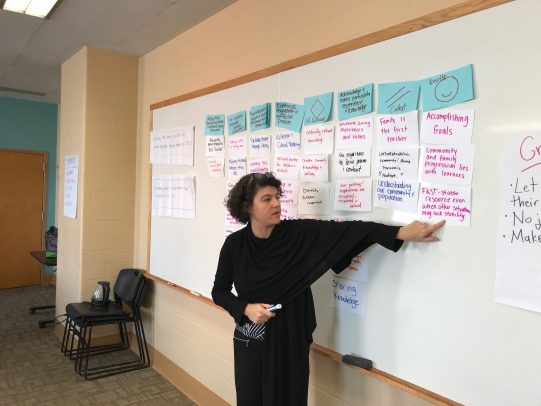Professor quickly pivots to creative, online learning approach

When the COVID-19 pandemic hit in the spring, Kira Baker-Doyle, UIC associate professor of curriculum and instruction and director of the Center for Literacy, was forced to transition quickly from a face-to-face class to online teaching.
Baker-Doyle knew she would have to prepare differently than a typical online learning experience because there was little time to redesign the course for online learners, and many students at UIC and other colleges nationally were experiencing trauma and difficulties at home related to the COVID-19 pandemic and its social and economic consequence.
“The second half of spring semester is better described as ‘crises teaching,’” said Baker-Doyle, who is in the College of Education.
Having taught online courses previously, she tapped into this experience, as well as past research, notably, her most recent book, “Transformative Teachers: Teacher Leadership and Learning in a Connected World” (Harvard Education Press, 2017), which focuses on how teachers leverage media and technologies to organize for social justice and educational change. So, past research and knowledge informed a lot of her practice.
One of the changes she made this spring was to co-design the final project with her students based on their capacities and situations and took in the world context as well. This made the final project relevant, useful and somewhat cathartic for students. They engaged fully in the project, she added. Ultimately, students co-created a blog documenting their experiences as educators, parents and school leaders during the pandemic as their final project.
Another change she made was inviting authors of the assigned readings to be virtual guests of the class. Many authors had more time to do this because they were all working from home, and it helped students to feel a lot more engaged because they knew they were going to talk with the authors about what they read, she said.
One of the students in the class was Alexis Grant, a doctoral student from the School of Public Health. What made online learning work well, Grant said, was Baker-Doyle’s ability to make each week engaging with Zoom discussion-based classes. In addition, Baker-Doyle was able to connect with the class by emailing more frequently — sending reminders, sharing resources — than earlier in the semester.
“Sometimes I think emails are better than Blackboard announcements because they allow for everyone in the class to reply all and engage in a conversation throughout the week, which I think was good for keeping a good connection between me and my peers,” Grant said.
Grant said Baker-Doyle did an excellent job of leveraging the opportunities presented by online learning.
“We have access to guest speakers and guest lecturers that may not have been able to attend in person,” she said. “This made each online class particularly engaging, and it was cool to hear straight from the authors about the article we read each week and their current work.”
As students prepare for summer courses and lecture classes with more than 70 participants to remain online into the fall, there are resources available to help students make the most of their online learning experience.
